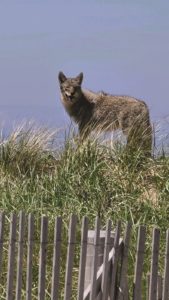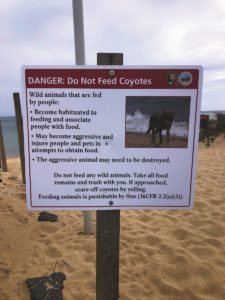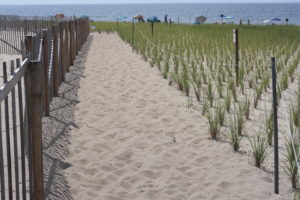PROVINCETOWN — Lumber, Crocs, fishing gear, medical tubing, broken beach chairs, and beer cans were among the three truckloads of trash gathered in two hours’ time by volunteers at Herring Cove Beach on Jan. 14. Afterwards, the group’s gleanings were counted and logged in a database at the Center for Coastal Studies.
Herring Cove Beach
‘Trailblazing’ With Campfire Quorum
Campfire Quorum, a new nonprofit theater company led by artistic director Megan Nussle, launches its first season with “Trailblazer,” a theatrical walking tour of Herring Cove Beach in Provincetown. It will take place on Saturday, May 29th, between 7:30 and 10:30 p.m.; rain date Sunday, May 30th.
The theater company’s mission is “nomadic, organic, fantastic live theatrics” according to a press release. “Trailblazer” is a fund-raiser for Campfire Quorum’s upcoming production of Thomas Middleton’s The Witch, which will take place in August. Sign up for a 40-minute slot at campfirequorum.org.
Paved Paradise
Performer Zoë Lewis and artist Jay Critchley, in conjunction with Swim for Life, are presenting Tarmac Tuesday, an event to clean up the eroded tarmac at Herring Cove Beach. It will take place Tuesday, September 1st, at 5 p.m. Go to Zoë Lewis’s Facebook page for details.
FOX NEWS
Seeking a Fair and Balanced Relationship With the Wild
The charm and danger of having a den next door
PROVINCETOWN — Carrie Medina Notaro first noticed the female red fox in her East End neighborhood in early January and began having “conversations” with her.
WILDLIFE
Coyote Shot at Herring Cove Beach
Rangers respond after a woman is bitten and a dog is killed
PROVINCETOWN — Memorial Day weekend may have been quiet for some, but Herring Cove Beach was the scene of almost daily drama caused by at least one aggressive coyote, which was shot and killed Monday evening by Cape Cod National Seashore rangers.
Rangers had posted signs at the entrance to the beach on May 15 asking visitors not to feed coyotes.
What the sign did not say was that the Seashore was getting complaints that at least one coyote was brazenly following dogs and humans and could not be easily scared off.
These complaints got more serious in the days that followed, leading to a dog injured on May 21, a woman bitten or nipped on May 23, and a dog killed in front of its owners on May 25.

Later that same night, a Seashore ranger shot the coyote that killed the dog. The rangers believe it was the same animal, because they had been using a paintball gun to “haze” or deter aggressive animals and this one had the telltale paintball markings, said Seashore Supt. Brian Carlstrom. There may be other aggressive coyotes at Herring Cove, he added.
Coyotes had begun to congregate there in March, he said.
Carlstrom called the shooting of the coyote the sad result of feeding wild animals, something that has been an ongoing problem at this beach, as well as at Beech Forest, where people feed songbirds and geese. Within the last two months, a visitor was cited for feeding a fox at Province Lands Visitor Center, he noted.
But at Herring Cove, in particular, people have left out dog food and fish heads to feed the animals, Carlstrom said. Since Herring Cove is a popular place to let one’s dog run off leash — despite rarely enforced leash laws within the Seashore — this created a deadly situation that came to a head last weekend.
On Thursday, May 21, Karen Cappotto of Provincetown had just taken her miniature schnauzer, Pearl, off her leash at the end of the new parking lot at Herring Cove when a coyote ran out of the dunes and grabbed her in its jaws, Cappotto said. The coyote didn’t get a good hold, however, so when Pearl fell out of its mouth, Cappotto lunged to save her.
Cappotto said she grabbed her dog and fell on the sand, at which point, the coyote approached both of them. A friend who was there with her threw rocks and other objects at the coyote to finally get it to go away.
“I cannot go to the beach anymore,” Cappotto said. “I’m terrified.”
A veterinarian at Herring Cove Animal Hospital treated Pearl for five puncture wounds, and she is recovering, Cappotto said.
On the morning of May 23, a woman was bitten or nipped on the ankle while she was reading at Herring Cove Beach, Carlstrom said.
That evening, a visitor, Art Rawling, heard a woman screaming and running up the beach toward the Far Land concession stand in the south parking lot. A coyote was chasing her 10 feet behind, and stopped its pursuit only when Rawling and a friend approached.
“She was really scared and screaming for help,” Rawling said.
On Monday, May 25, Denise Michel of Provincetown and a friend were at Herring Cove around 4:30 p.m. and saw a ranger with a paintball gun.

Two hours later, around 6:30 p.m., a young couple was tossing a ball with their small dog near the so-called “boy beach” by the south parking lot when a coyote suddenly ran out of the dunes, grabbed the dog in its mouth, and ran back into the dunes, said Dana Demers of Provincetown who was walking nearby at the time.
“We couldn’t catch the coyote — the sand was too soft,” Demers said. “It was the most horrific thing I’ve ever seen in my life.”
Demers said when he last saw the dog, which he estimated to be about 16 pounds, it was limp in the coyote’s mouth, and the owner was screaming and crying. The police arrived quickly to take a report, he added.
“The coyote was huge, really big,” Demers said. “I feel bad for the coyote. Now it will be killed and her pups will be left alone. It’s just sad. I saw all these people at the beach with their dogs, and I wanted to say, ‘Don’t bring your dogs here!’ ”
Carlstrom said he does not know if the coyote was a mother with pups.
Though the Seashore’s mission is to protect wildlife and nature, when an animal repeatedly acts aggressively towards humans, “We will kill it,” Carlstrom said.
But the larger problem is humans feeding the coyotes.
“The story is, really, stop feeding wild animals,” said Provincetown Police Chief Jim Golden.
There is a documented history of people feeding animals at Herring Cove Beach. In 2013, park rangers issued a citation to someone for feeding coyotes at Herring Cove. At that time, as many as five coyotes were begging among the parked cars in the evenings.
The coyote at Herring Cove, or possibly more than one coyote, is exhibiting all the classic behaviors of an animal that has become “habituated” through feeding by humans.
“It has lost its fear,” Carlstrom said.
In a press release, Carlstrom noted, “Unfortunately, scenes like this play out frequently in national parks. People don’t understand the implications of approaching or feeding wildlife, often leading to tragic consequences for the public and the animals.”
ENVIRONMENT
23 Park Structures at ‘High Risk’ From Climate Crisis
Officials design movable structures in response to erosion
TRURO — The climate crisis is “the greatest threat to the integrity of our National Park Service that we have ever experienced, and we’re at the forefront of it,” according to Cape Cod National Seashore Supt. Brian Carlstrom.
Responding to that threat includes getting creative with practicalities like dune stairways and beach bathhouses. That’s because one of the Park’s priorities is to preserve public access to the shore.
“The first site I came to here in 1986 you can no longer visit,” Carlstrom said, referring to an older configuration of Marconi Beach’s visitor access in Wellfleet.
About 35 people came to Payomet Performing Arts Center in North Truro on Aug. 14 to hear Carlstrom talk about the effects of the climate crisis on local Park Service facilities.
“We have a lot of resources in the near shore environment,” Carlstrom said. “We’ve analyzed over 200 structures and found 23 in total to be very high risk.”

Carlstrom showed slides of changing National Park lands from around the U.S., ranging from a dramatic photograph of a pronounced “bathtub ring” in the Lake Mead Recreational Area in Arizona and Nevada, where water levels have dropped over 100 feet in 20 years due to drought, to a disappearing Klondike Gold Rush glacial field in Alaska.
Here on the Outer Cape, he said, sea level rise and erosion are the most immediate challenges.
New access configurations at Herring Cove Beach in Provincetown and Nauset Light Beach in Eastham are two recent projects that model a new strategy for accommodating visitors where erosion is intense. One of the Park’s strategies, CCNS maintenance chief Karst Hoogeboom told the Independent in a phone interview, is “to reduce the amount of structure at the beach and just have the essentials there.”
Because erosion is so unpredictable, the National Seashore is now also designing beach facilities to be movable, according to Carlstrom.
“The average long-term rate of retreat at Herring Cove Beach has been 2.5 to 3 feet per year for more than a century,” said Mark Adams, a geographic information specialist and coastal geology technician with the Park Service, via email. “It’s difficult to simplify, but the Herring Cove north parking lot was subject to a rapid erosion hot spot from 2012 to 2018.” This area now seems to be protected by the growth of a barrier spit from Hatches Harbor.
Ensuring structures are easier to move starts with building them strong enough to withstand a move, according to Hoogeboom.
And if buildings are being moved, that means plumbing will be, too. Park staff are considering various plumbing choices for beach facilities.
“In some locations we’ve done vault toilets, which are a toilet building with, in effect, a big container underneath that you pump out periodically,” Hoogeboom said. The Herring Cove facilities are hooked up to the Provincetown sewer, and the Nauset facilities will have a title 5 septic system.
The bathhouse complex and concession stand at Herring Cove is a model for the entire Park complex, Carlstrom said, because they were designed to make moving them straightforward. Though given current erosion patterns, he added, “We don’t anticipate having to do so for at least a decade.”
